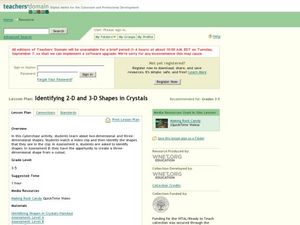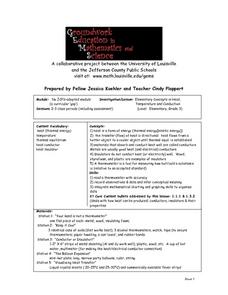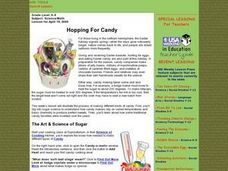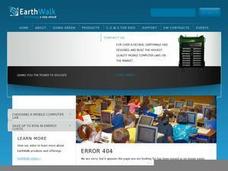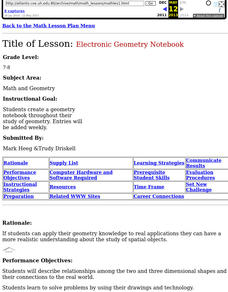Institute of Electrical and Electronics Engineers
Sugar Crystal Challenge
Blow your learners' minds with a sweet lesson on nanotechnology that uses sugar to demonstrate the difference nanoscale surface area makes in dissolving and crystal formation. Plenty of supportive background information is read to...
Curated OER
Identifying 2-D and 3-D Shapes in Crystals
Students view a video on making rock candy and identify the shapes they see while watching. In this 2 and 3 dimensional shape lesson, students recognize shapes and complete worksheets to identify them. Students build a cube....
Curated OER
Snowflake Bentley
Learners explore crystals through the story Snowflake Bentley and then create crystal pictures of their own. In this interdisciplinary lesson, they create a crystal web chart on chart paper, design artificial snowflakes, and write poems...
Curated OER
The Secret of the Crystal Ball
Eighth graders use mathematical expressions to solve problems. In this basic properties of operations, 8th graders use prior knowledge and logical reasoning to solve equations. Students analyze an equation by solving a...
Curated OER
Crystals: What Are They and What Holds Them Together
Students are introduced to the characteristics of crystals and what keeps them together. Using the Periodic Table, they examine the various elements and develop a model of an atom. In groups, they place sugar and salt in petri dishes...
Curated OER
Elementary Concepts in Heat
Third graders read a thermometer with accuracy, record observations and data, and infer conceptual meaning. They integrate mathematical charting and graphing skills to organize their data. They explore what happens when they touch or use...
Curated OER
Growing Rock Candy
Students observe the growth of rock candy. In this crystal growth lesson, students make rock candy and measure the crystal growth over five days.
Curated OER
Snowflake Crystals
Fourth graders explore physical changes and the true life story of Wilson Bentley. They observe the changes that take place with snowflakes. Students discuss what happens when snow flakes melt. They create their own snowflakes using...
Curated OER
Alternative Snowflakes
Students discover how snowflakes in nature are really formed, and recreate this process with paper and glue.
Curated OER
Hopping For Candy
Students explore recipes online for different types of candy, and simulate process of making candy to explain how candy makers rely on varied temperatures and basic chemistry to produce perfect sweets.
Curated OER
Tessellations
Students identify and construct figures that tessellate. They investigate which regular polygons tessellate and how to modify them to make other tessellating figures. Students explore how naturally occurring tessellations have been...
Curated OER
Pumpkins!
Students discuss emotion, draw pumpkin faces and write about the way their pumpkin is feeling. In this emotions lesson, students make pumpkin faces and match pumpkin seeds to a card with seeds.
Curated OER
Finding Areas of Triangles, Rectangles, and Circles
Students find the areas of geometric shapes. In this geometry instructional activity students find and measure the sides, perimeters, and areas of quadrilaterals, triangles, and circles. Students relate the measures to the others by...
Baylor College
What Is a One Part Per Million Solution?
Water may appear to be crystal clear, but there could be dissolved substances present. Lab groups make a one-part-per-million of a food coloring solution to demonstrate this concept. As part of an outstanding unit about water, this...
Curated OER
Science: Suddenly Snow
Students engage in snow-related activities during the first winter snowfall. After explaining the elements needed for it to snow, they preserve snowflakes on frozen slides and observe them under a microscope. Then, they write diamante...
Curated OER
How High Are the Clouds?
Students analyze height and collect data to create a graph. In this statistics instructional activity, students use central tendencies to analyze their data and make predictions. They apply concept of statistics to other areas of...
Curated OER
Electric Circuits
Students explore energy by completing an electricity worksheet. In this conductors lesson, students define the energy related vocabulary terms circuit, electronics, conductor and semi-conductor before examining computer chips in class....
Curated OER
Where Does Radon Come From?
Learners discuss the differences between the three types of rocks and how radon can escape from the rocks themselves. They analyze other sources of radon in the environment. They work together to complete an activity and worksheet.
Curated OER
Unit 13: Graphs, Correlation, Line of Best Fit
Students explore the concepts of graphs, correlations, line of best fit, and the dipstick problem. In this graph, correlation, line of best fit and dipstick problem lesson, students solve problems on the above mentioned topics. ...
Curated OER
Spotlight on Students
First graders participate in social skills activities at the beginning of they school year that including graphing work. Each student acts as the "Top Banana" while other students ask them questions about their likes and dislikes. As a...
Curated OER
Electronic Geometry Notebook
Students examine the relationship between two and three dimensional shapes. They use their drawings to solve problems. They create a notebook of the formulas and how they relate to the real world.
Curated OER
Discovering Friction
Students watch a demonstration that introduces them to the idea that friction is a force that impedes motion when two surfaces are in contact. They work in groups to experiment with frictional force using a coffee cup on which they alter...
Curated OER
How Wet Did It Get?
Students measure the rainfall/snowfall on the playground on a rainy/snowy day with a rain/snow gauge. They draw a bar graph representing the amount of water that fell and observe a satellite image of the clouds and local weather system...
Curated OER
Minerals
Young scholars explore the concept of minerals. In this minerals lesson, students discuss how cooling affects the size of crystals. Young scholars discuss how the structure of minerals is a tetrahedron. Students discuss the structure of...

